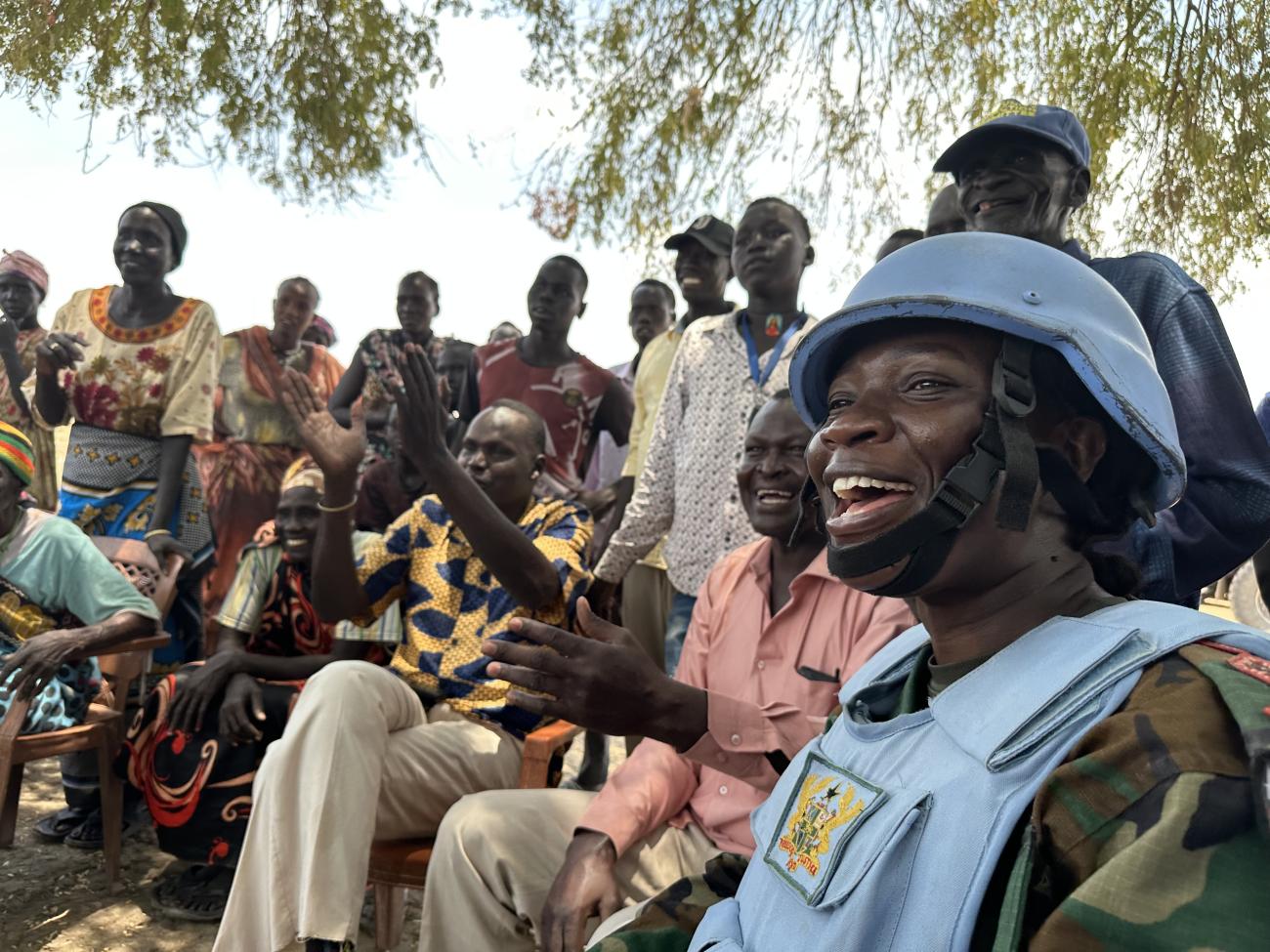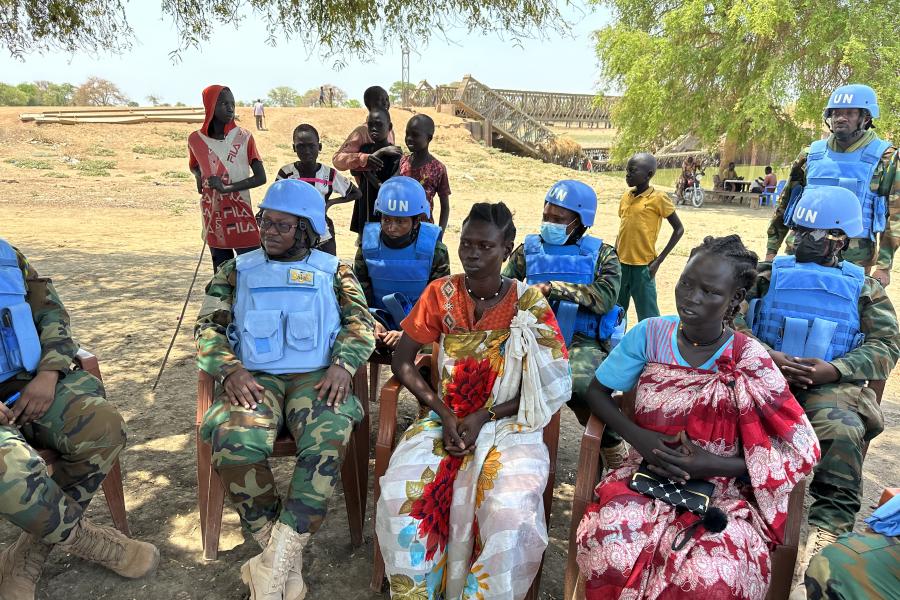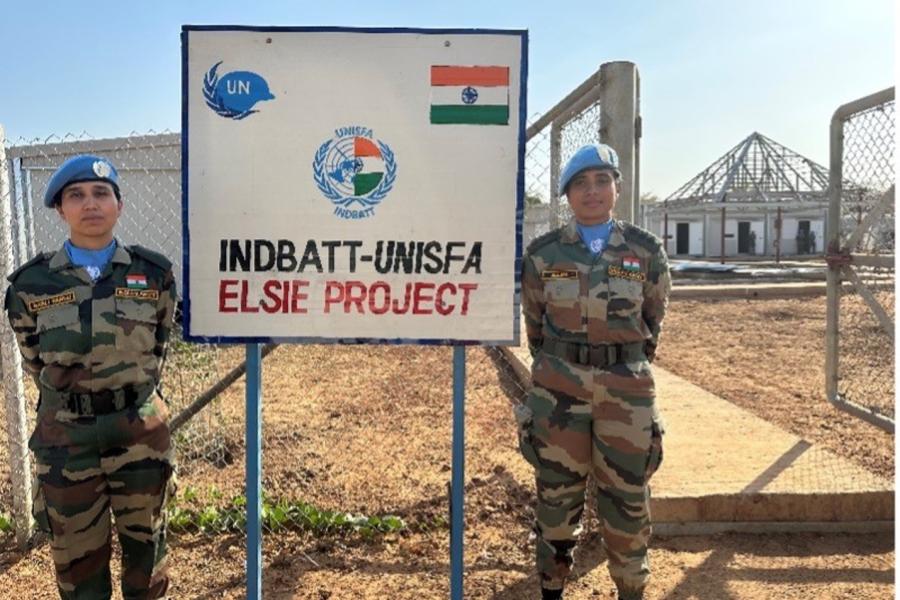Engagement Platoons champion gender parity in peacekeeping and beyond

We explore how uniformed women from Ghana and India, beneficiaries of the Elsie Initiative, contribute to implement the mission mandate and protect civilians
“During [the] second patrol of our platoon to Noong and Kollam areas, the young girls of the village invited us to their tukul (hut), which is something they never do when only male soldiers patrol the area,” says Captain Seema Gowdar.
Captain Gowder was recently deployed with 26 fellow women peacekeepers to the UN Interim Security Force for Abyei (UNISFA), as second-in-command of the Indian Engagement Platoon, India’s largest deployment of women peacekeepers in 15 years.
Corporal Lakshmi Pradhan, who joins her in patrols and static security duties, shares her aspirations for the platoon: “I hope that our presence and interaction here inspire and motivate young girls of Abyei to attain education so they can be soldiers, teachers, or anything they want.”

The United Nations Engagement Platoon, a relatively novel military capability within UN Peacekeeping, refers to groups of military peacekeepers who are deployed to support peace operations by engaging communities, particularly women and children. By deploying mixed teams that comprise around 50% of women, the capability contributes to implementing the mission mandates and promotes gender parity.
"Engagement platoons help build trust, prevent conflicts, and support stabilization efforts. This is crucial because addressing the needs of entire communities, including those of women and girls, requires the building and strengthening of relationships,” says Lieutenant Colonel Lausanne Nsengimana Ingabire.
The UN office of Military Affairs, where Lt. Col. Ingabire works, gives priority to developing a curriculum that supports Member States to prepare their peacekeepers for deployment. The curriculum focuses on providing tailored, pre-deployment training for platoons which includes scenario-based exercises involving the technical requirements needed to engage with civil society members.
Training is a vital component in ensuring that peacekeepers can effectively deliver their duties. Part of ensuring this delivery also comes from making certain that men and women peacekeepers are given equal living and working conditions to carry out their tasks and thrive in what they do.
The Elsie Initiative, a pilot project through Canada, helps create supportive conditions for women peacekeepers in the field. In Abyei, it has funded safety improvements in order to make women’s living conditions in campsites equal to their male counterparts. This aspect of gender-sensitive peacekeeping helps uniformed women fully contribute their potential to implement the mission mandate and protect civilians.
For conflict-affected villages in Abyei, some of which experienced attacks as early as January of this year, the diversity provided by Engagement Platoons deployed by UNISFA has already yielded positive results.
For instance, in Majbong, a community in Southeast Abyei, the support of the Ghana Engagement Platoon comes at the right time. Following a spike in community violence early January 2023, this 22-strong platoon has stepped up its presence and kept regular checks on the plight of displaced persons in the volatile area.

According to the information gathered by the peacekeepers, including women in uniform, community members have gradually begun returning to the village and sleeping in their huts. When the violence erupted, they had begun spending the nights in the surrounding bush, placing the women at particular risk of further harm.
The local leaders in Majbong say people have felt safer since the battalion increased the frequency of static and mobile patrols in the area. “The mixed patrols are paving the way for normal life to continue. You see, their presence is boosting the confidence of members of the community to go about daily activities safely,” asserts Deng Paul Mankuol, a traditional chief.
The impact of the Indian Engagement Platoon has also been noted in the village of Kollam. Similar to Majbong, local community members have been hesitant to return to the area after an attack on the village in 2022. When the Indian battalion first accessed Kollam, only one person, an elderly woman, still occupied the area. Most of the community had fled the area due to fear of future attacks. But since the platoon’s arrival in January, the communities in Kollam have gradually begun returning to their homes.
The Indian Engagement Platoon and the Ghanaian Engagement Platoon represent two examples of the ways diverse teams can make UN peace operations more effectively support the communities they serve and protect.




